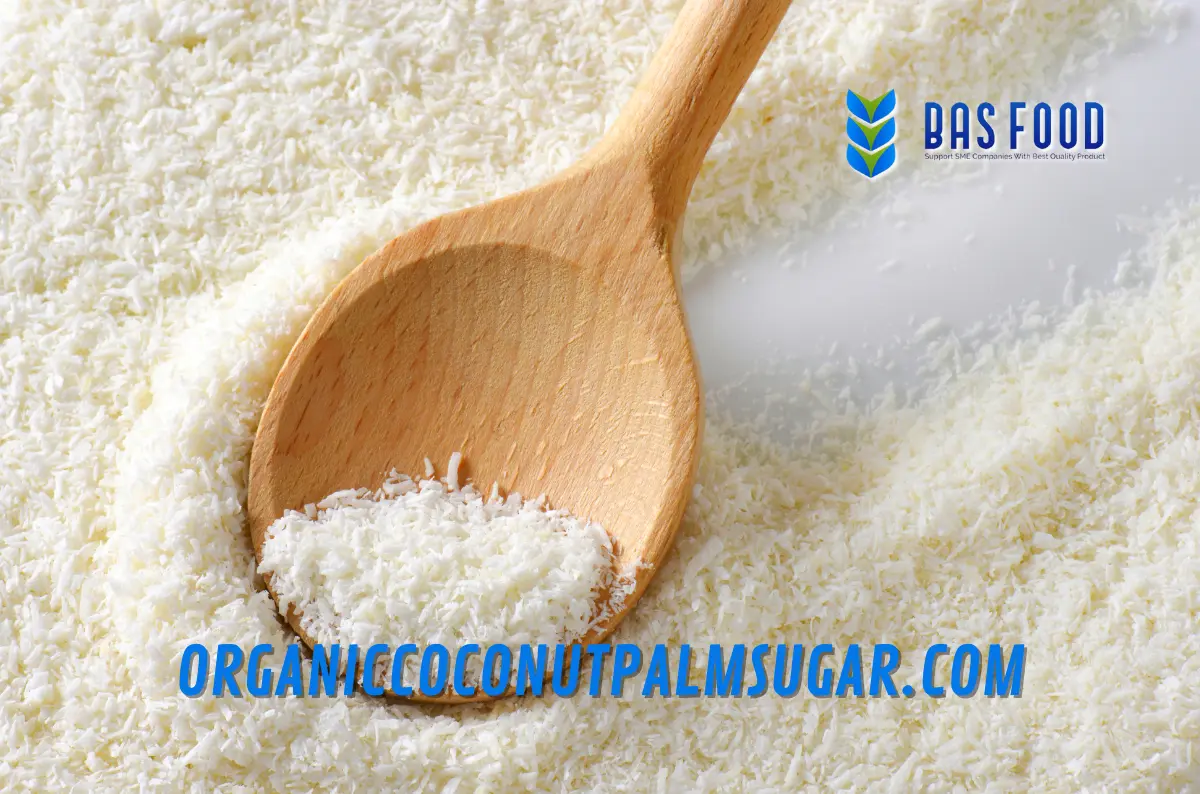Desiccated coconut has long been a versatile ingredient in the global food industry. From pastries and chocolates to curries and cereals, this finely grated and dried coconut meat adds texture, flavor, and nutrition to countless recipes. But behind every bag of desiccated coconut lies a key factor that determines its quality — fat content.
In the market, you’ll often hear about high fat desiccated coconut and low fat desiccated coconut. While both come from the same fruit, their uses, texture, and flavor vary significantly. Understanding these differences can help food manufacturers, bakers, and importers choose the right product for their needs.
This article explores the characteristics of high fat versus low fat desiccated coconut, explains how coconut moisture content impacts quality, and highlights why Indonesia has become a global hub for premium coconut production.

What Is High Fat Desiccated Coconut?
High fat desiccated coconut typically contains 60–65% oil content, which gives it a rich, creamy taste and moist texture. It is made from the freshly grated white meat of mature coconuts that are carefully dried to preserve their natural oils. The result is a fragrant, flavorful product that enhances desserts, baked goods, and savory dishes.
Because of its high oil content, this type of desiccated coconut has a luxurious mouthfeel and a stronger coconut aroma. It’s commonly used in confectionery, biscuits, granola bars, and premium desserts where richness and depth of flavor are desired.
Manufacturers and chefs often prefer high fat desiccated coconut when aiming for indulgent recipes. Its fat acts as a natural flavor carrier, making every bite more satisfying and aromatic.
Understanding Low Fat Desiccated Coconut
On the other hand, low fat desiccated coconut has its oil content reduced to around 40–45% through controlled pressing before drying. This makes it lighter, drier, and less greasy, which is ideal for specific food applications that need texture without excess oil.
Low fat desiccated coconut is widely used in health-conscious products such as protein bars, diet-friendly snacks, and powdered drink mixes. Its longer shelf life and lower calorie count also appeal to brands targeting wellness consumers.
Even though it has less natural oil, low fat desiccated coconut still delivers a pleasant coconut flavor and fiber content. It’s also easier to handle in industrial-scale food manufacturing since it blends well with other dry ingredients like flour or sugar.
The Role of Moisture Content in Coconut Quality
One of the most critical factors in maintaining desiccated coconut quality is moisture content. A proper balance ensures freshness, prevents mold growth, and retains flavor. According to international standards, desiccated coconut should have a maximum moisture level of 3%.
For high fat desiccated coconut, controlling moisture is even more important. Excess water can accelerate oil rancidity and shorten shelf life. Producers must dry the grated coconut precisely — not too dry that it loses its texture, but not too moist that it spoils easily.
In contrast, low fat desiccated coconut can tolerate slightly lower moisture because of its reduced oil content. However, both varieties require airtight packaging and cool storage conditions to maintain quality during shipping and storage.
Comparing High Fat vs Low Fat Desiccated Coconut
While both types serve unique purposes, here’s a simple breakdown of their main differences:
| Feature | High Fat Desiccated Coconut | Low Fat Desiccated Coconut |
|---|---|---|
| Oil Content | 60–65% | 40–45% |
| Texture | Rich, moist, and creamy | Dry, light, and coarse |
| Flavor | Strong coconut aroma | Milder coconut taste |
| Best Use | Desserts, pastries, confectionery | Snacks, mixes, and health foods |
| Shelf Life | Moderate | Longer |
| Caloric Value | Higher | Lower |
High fat desiccated coconut is often preferred by bakeries and dessert manufacturers who prioritize taste and texture. Meanwhile, low fat variants are better for mass production of dry or low-calorie goods.
Both play essential roles in the food industry, showing the versatility of coconut as an ingredient that adapts to diverse market needs.
Quality Standards for Desiccated Coconut
Meeting international coconut quality standards is crucial, especially for exporters. Reputable suppliers like CV Bonafide Anugerah Sentosa ensure their products comply with strict food safety and quality certifications such as HACCP, ISO, and Organic Standards.
High-quality desiccated coconut must meet these key criteria:
- Color: White to off-white, with minimal discoloration.
- Taste and Odor: Natural coconut flavor with no sourness or rancidity.
- Moisture Content: Below 3%.
- Free from Impurities: No shells, husks, or foreign materials.
Producers who follow these standards maintain not only product consistency but also consumer trust. This consistency has made Indonesia one of the world’s top suppliers of premium desiccated coconut.
Indonesia’s Role in Global Desiccated Coconut Supply
Indonesia is home to vast coconut plantations spread across islands like Sulawesi, North Sumatra, and Java. With its tropical climate and rich soil, the country produces coconuts with superior oil content and aroma — perfect for both high fat and low fat desiccated coconut production.
The Indonesian government and local manufacturers have invested heavily in modern drying and processing facilities. These technologies allow producers to maintain natural flavor while achieving consistent texture and hygiene standards.
Companies such as CV Bonafide Anugerah Sentosa play a key role in connecting Indonesian coconut farmers with international buyers. As a trusted supplier and exporter of coconut products, including desiccated coconut, coconut sugar, and coconut milk, the company upholds sustainability and quality at every step — from sourcing to export logistics.
Sustainability in Coconut Processing
Modern consumers increasingly value sustainability. The good news is that desiccated coconut production in Indonesia has evolved toward eco-friendly processing methods. Producers now utilize coconut waste — such as shells and husks — for biomass energy or organic fertilizers, reducing environmental impact.
Sustainable practices also include:
- Fair sourcing: Working with local farmers under equitable trade agreements.
- Organic certification: Ensuring coconuts are grown without harmful chemicals.
- Efficient water and energy use: Recycling water and using renewable energy in drying processes.
By combining tradition with innovation, sustainable desiccated coconut producers help protect the environment while supporting rural economies.
How Importers Can Choose the Right Desiccated Coconut Supplier
Choosing the right supplier is critical for businesses in the food and beverage industry. Here are a few points importers should consider:
- Check certifications – Ensure the supplier meets food safety and organic standards.
- Request product samples – Assess texture, aroma, and moisture level.
- Confirm origin – Indonesian coconuts are known for their high oil content and clean flavor.
- Evaluate supply capacity – A reliable exporter should handle bulk orders consistently.
CV Bonafide Anugerah Sentosa has earned a reputation for being a dependable exporter of high fat desiccated coconut, low fat desiccated coconut, and other coconut derivatives. The company’s commitment to quality and transparency has made it a preferred partner for global importers.
Conclusion: Choosing Quality You Can Taste
The difference between high fat and low fat desiccated coconut goes beyond numbers. It defines the texture, flavor, and final quality of countless food products worldwide. Understanding moisture control and quality standards helps buyers select the best type for their needs.
As global demand grows, Indonesia remains a key player in delivering premium desiccated coconut to international markets. With suppliers like CV Bonafide Anugerah Sentosa, importers can count on consistent quality, sustainable sourcing, and professional export support.
Whether you’re crafting indulgent desserts or developing healthy snacks, the right desiccated coconut makes all the difference — and Indonesia’s coconut industry ensures that difference shines through every product.
Contact CV Bonafide Anugerah Sentosa how we can provide the best solutions for you. WhatsApp: +62 8213 4505 737, Email: info@bonafideanugerahsentosa.com / bas.mdir@gmail.com.

